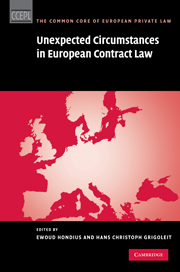Book contents
- Frontmatter
- Contents
- List of contributors
- Books in the series
- General editors' preface
- Preface
- List of abbreviations
- Part I Introduction and context
- 1 Introduction: An approach to the issues and doctrines relating to unexpected circumstances
- 2 Legal history
- 3 Law and economics: the comparative law and economics of frustration in contracts
- Part II Overview
- Part III The case studies
- Part IV General comparative remarks
- Appendix: Some Texts on Change of Circumstances
- Selected bibliography
- Index
- References
3 - Law and economics: the comparative law and economics of frustration in contracts
Published online by Cambridge University Press: 04 April 2011
- Frontmatter
- Contents
- List of contributors
- Books in the series
- General editors' preface
- Preface
- List of abbreviations
- Part I Introduction and context
- 1 Introduction: An approach to the issues and doctrines relating to unexpected circumstances
- 2 Legal history
- 3 Law and economics: the comparative law and economics of frustration in contracts
- Part II Overview
- Part III The case studies
- Part IV General comparative remarks
- Appendix: Some Texts on Change of Circumstances
- Selected bibliography
- Index
- References
Summary
Introduction
Frustration of purpose is a defence to the enforcement of a contractual obligation. Legal systems generally provide this defence when an unforeseen event undermines a party's purpose for entering into a contract. In many legal systems frustration of purpose is often treated and discussed jointly with the related doctrine of impossibility, which concerns situations where unforeseen events render impossible (practical impossibility) or far more burdensome (economic impossibility) the performance of the obligations specified in the contract. Although different in their substance, the economic analysis of the doctrines of frustration and impossibility share a common logic. In the following analysis we shall therefore treat these doctrines together.
When unexpected contingencies occur during the performance of a contract, there may be a divergence between what the parties have expressly agreed upon in the contract and what they have implicitly assumed was their contractual obligation in terms of assumption of risk. In other words, when there is a period of time between the conclusion of the contract and the performance of the parties, there may be a fundamental change of circumstances that makes the performance of the contract far more burdensome, or even physically impossible, for one party, or that completely frustrates the purpose of the contract for one party. The event that causes the change is, as said, unexpected or unforeseen and is not explicitly referred to in the parties' agreement. If it were in the parties' agreement, the general rules on breach of contract would apply.
- Type
- Chapter
- Information
- Unexpected Circumstances in European Contract Law , pp. 33 - 52Publisher: Cambridge University PressPrint publication year: 2011



